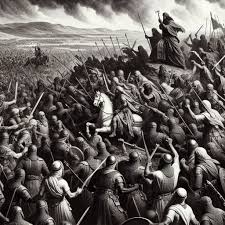When The Bible Seems Too Shocking To Love: Learning to Read the Bible Rightly
by G.S. Augustine

Only A Book Of Inspiring (Fictional?) Stories?
Jenifer Butler, in her book Who Stole My Bible, says that growing up in an evangelical household with unquestioned faith in the Bible destroyed her confidence in it. She loved the Bible as a child and it’s magical stories as she puts it, but coming across Bible passages as a teen that seemed to show God as a tyrant caused her to question all she thought she knew. God ordering Joshua to kill every man, woman and child in Canaan and the destruction of all humanity at the flood were a couple examples. But since the Bible is a powerful book that she still finds appealing, she reinterprets the Bible as merely stories that teach inspiring truths. For instance, the flood is not an historical event of God judgement but a mythic story showing God’s desire to rescue humankind from their evil ways.
Of course, the flood story is of course a rescue, and indeed for the human race as a whole, but it is also a story of judgment and the Bible in both the Old and New Testaments sites that event as a warning. And although, the biblical story is highly compressed, there is no evidence that it is a fiction. In fact, just about every culture on earth has a ancient flood story, and whole cities still somewhat in tact exist at the bottom of the Black Sea. The present conclusion is that these cultural stories exist because a massive flood did take place in history. The Bible claims to be giving us the true though abbreviated facts surrounding it. Disagreeing with that claim is not proof the story is fiction.
The Real Problem: God As Judge
The real problem with the story is modern sensibilities do not wish to speak of a God of judgment. They want to think of God like themselves— inclusive of all points of view, sexual orientations and religious beliefs, casting no judgment on anyone. And yet, the more “modern” we get, the more judgmental we get—and violently so. To disagree with modern notions of right and wrong today is to risk protestors burning of your house down. And if you belong to a political or religious group that disagrees with these notions, activists might very well put on masks and beat you with a baseball bat. Of course when they do such things no one calls it tyrannical—its just “peaceful” protest—your hospital stay notwithstanding.
Whose Standard Is Right?
I would like to show in this article that if we are going to “judge” anything, we cannot automatically assume that the standard we use in the modern world is unquestionably the right one—especially since modern secular society rejects the notion of absolutes. Values, secularists assert, are relative to what the majority of people want them to be or what they believe work the best. They then apply these subjective standards to the Bible—a different culture in a different place in an ancient past—as if they were always and everywhere the objective ones.
The standards we use today replaced accepted standards just a few decades ago. But as soon as the modern world thinks differently, the standards will change again. Future generations may even decide what we consider today a moral necessity as pure evil. And if we’re honest, the standards we use today are not really the ones the majority of people agree on but the ones the most powerful voices say they are. Propaganda more than enlightenment determines modern morals. Conversely, Biblical morality does not change, though people’s understanding of it grows over time.
But Some Things Are Always Wrong
For instance, if we make a reasonable case that there are just some things that everyone believes are wrong, we still must take into account the particular problems that existed in an ancient world. In 1400 BC, when a people group faced draught or famine, they often attacked and killed neighboring groups to take theirs. Ancients considered it normal behavior. Might equaled right. Making sure that didn’t happen to you required tactics that aren’t necessary in the Western world of international trade and food abundance. Completely changing those tactics in an uncertain world could not happen very fast. Most of us never even think of bands of raiders regularly sweeping in to our towns to rape and kill indiscriminately. In the ancient world, that could happen on any bright sunny morning.
The Bible on one hand may allow for something that the ancient world assumed normal while putting strict guard rails on the behavior to protect the life and basic welfare of people involved. Redeeming a stiff-necked nation like Israel (or any society, really) would only succeed one step at a time. We’ll provide some examples below. But first we must get a clearer picture of Bible values and how they are prioritized.
The Bible Prioritizes Allegiance to God
So what are the Bible’s moral values and how are they prioritized? From the point of view of the Bible, allegiance to God is the highest value. And this makes perfect sense. If God is the source and sustainer of all life, than to cut oneself off from that God is to cut oneself off from life itself, i.e. to experience death. If this is true—not just philosophically but ontologically—then, like a lifeline that holds an astronaut while working on the outside of a space station 250 miles up, whatever it takes to maintain that connection would be the highest value (at least to the astronaut!).
But the Bible takes it a step further: existence is not life. Just breathing, eating, and chasing happiness is not life, from the Bible’s point of view. They are some of the benefits of life, but they are not life itself. The Bible defines truly living as loving God first and loving people as yourself. These are inexhaustible subjects which we do not have the space to discuss here. But we can say that the Bible makes clear that failure to love God will result in failure to love people. And failure at both will result in deadness in us whether one is still breathing or not.
Everyone Lives Forever
At this point, it is a good idea to more properly define this eternal life that all people will have. Everyone continues to have some sort of existence after their body dies (the parable of the rich man and Lazarus, though a parable assumes Jesus hearers understood life after death in some form, see Luke 16:19-31). Bear in mind this is the structural thinking of the Bible. Additionally, Jesus claims that all people will rise from the dead:
“Do not be amazed at this, for a time is coming when all who are in the graves will hear his (the Son of Man’s) voice and come out—those who have done good will rise to life, and those who have done evil will rise to be condemned (John 5:28-29)
Our physical demise does not thwart God’s gift of life. To demand that we must experience life as we define it rather than as the giver of life arranged it is merely a humanistic claim that we are god and there is no other. A claim anyone can make, but it is not the internal system the Bible assumes. If the life we possess is a gift, how can we claim that God is being unjust in the form he gives it.
The Bible Is Internally Consistent
It doesn’t matter whether you agree with this arrangement. It is the reality upon which the Bible consistently operates. This may seem troubling to people given the almost universal belief that it is a grave evil if people should die before their allotted 80+ years. Ironically the Bible’s position is that death at any age is a grave evil. It is exactly death that all God’s actions in the Bible aim to overcome. There are some tragic things that human rebellion set in motion, but in the end death will be eliminated. If that is the case, one may wonder why God allowed death at all. But the Bible postulates that living forever in our present existence would be a far worse consequence than death.
If human beings live forever (a postulation the Bible consistently makes), what ultimately matters is his or hers final state. What happens on the road to get there isn’t unimportant, it’s just that it is not as important. If the road to a healthy sober life for an alcoholic isn’t possible unless he suffers the DTs, it might be worth it. Likewise, it may be worth trouble for 80 years to secure abundance for eternity. It will not do to say, the Bible is wrong about eternal life. It is the Bible’s position and therefore the basis upon which God acts in the Bible.
The Last Domino Is The Most Important
Our choices and actions set in motion other choices and actions not only for ourselves but everyone else around us like a falling set of dominos. When one knocks over a domino in a field of closely stacked dominos, they continue to fall over until the last one falls. If the last domino creates an ultimately good state, the whole process is good, even if some of the dominos along the way were painful.
The Bible maintains that our choices are connected and have effect throughout eternity. But who can see whether the last domino coming from a choice we make today is good? Only God could do that. And therefore God occasionally chooses something hard in the present to achieve something good in the future. When the Bible shows God doing this, it is consistent with its own values. And in light of those values, the Bible is consistently focuses on moral good.
So, Situational Ethics?
At first glance, one might argue that the Bible will do evil to eventually produce a good thing. Or that there is the need to do wrong for the greater good. This is not what the Bible is doing and indeed, the Bible would condemn this practice thoroughly because it is so easily corrupted.
However, if we assume (as the Bible does) that God has absolute authority over life because he created it, to use human sinfulness, say in war of one people group over another in order to curb their destructive practices, is perfectly legitimate if God holds the first group accountable for their actions as well. In the prophecy of Jeremiah, God uses the Babylonian King Nebuchadnezzar to end the abuse of power by the leaders of Judah over their fellow Jews. The worship of pagan gods had inflamed their desire for lavish living at the expense of the people.
When Babylon conquered Judah, that ended. But Babylon would also pay for their violence in dominating the world around them as well. In Isaiah 45, God declares that a Persian King would conquer Babylon and restore the remnant of Judah to their home. Just 70 years after the Babylonian King first invaded Judah, Cyrus, king of Persia swept away Babylon and restored the people of Israel back to their homeland beginning in 539 BCE.
The High Value of Freedom In The Bible
The Bible’s God gives human beings the freedom to love and obey him or reject him. Freedom in this regard is necessary because without it love is not possible. Coerced love is not love at all. Therefore God limits himself by love. His power can accomplish anything that power can do, but it cannot force love. God can do what is necessary to draw us to him by his goodness, but it is also a biblical fact that some people will reject him. And if we reject God, truly loving people becomes impossible despite what most of us believe.
Why Failure to Love God Fails At Loving People
We are finite and therefore have finite abilities to develop and use the resources of creation. Without the knowledge of an infinite God in our corner, this creates a sense of scarcity and fear of loss. We develop the thinking: “There’s not enough for everybody. One of us has to suffer. It’s either me or him, and I’d rather it be him.” Wars, murders, thefts, lies, and hatred all result from this fear of loss created by a sense of scarcity. Only an infinite God with infinite resources who unconditionally loves us can remove this fear.
Can’t Atheists Love Too?
There are those who would argue atheists love sacrificially too. But this will be limited to those close to them. It really doesn’t extend much beyond this unless we subordinate some of our desires to gain help from others. The shortness of our lives and the limitation on our resources can make it advisable to cooperated with each other.
But suppose we live forever with those who only looked out for their own welfare and saw you as a regular impediment to their hungers and lusts. Might even the best human beings eventually decide that good guys finish last? French Guiana ran an prison off its coast called Devil’s Island that let prisoners rule themselves without guards. They could live by their own ideas of right and wrong without interference by the authorities. It was so brutal a place that public opinion forced its closure in 1927.
The Very Definition of Hell
It is this last state that the Bible is trying to help us avoid. We call it hell. Ironically, in the Bible’s original language, it never uses the term Hell, but rather a description. Outer darkness where there will be weeping and gnashing of teeth is one. Darkness is a Bible picture where there is no knowledge of God. Without that knowledge people attempt to find life on their own and fail. The high percentage of depressed people in the world today is a testament to this.
Hell is not a torture chamber that God invented for infidels. Rather, the true biblical idea is that it is a place where people will get to live forever without having to bother with the rulership of God and of his Christ. Some people demand that God not interfere with their lives. And after all God’s arguments that this will not be a pleasant state, God finally gives in. He provides a place where they will live forever without his involvement. Despite those who believe that without God the world would live in peace, the very opposite is true.
The Engines of Power
There are only two engines of power available to the us. The first is the engine of force. This is the engine that all human governments us. We make laws and then enforce them with armed policeman and coercive punishments. When a nation gets out of line, we use military force to restore or keep the peace. The engine of force is quick and successful provided you have enough force. It’s downside is that it only lasts until a larger force comes along to challenge it. Therefore this engine is temporary in nature because sooner or later a stronger force comes along.
The second engine of power is love. Love convinces people to work together out of common benefit and respect. This is the engine of most friendships. A good friendship does not coerce but out of love attempts to counsel and to win over. This engine of power is slower and is not always successful. But when love does truly win over the beloved, it develops an unbreakable allegiance. Therefore this engine permanent in nature because the love engenders love.
God’s Role In The Engine of Love
The Bible demonstrates that genuine love is sacrificial. Ultimately love is the complete laying down of one’s life.
“Greater love has no one than this: that he lay down his life for his friends.” (John 15:13)
For us to lay down our lives for anything requires that there is something of greater value than our lives. It may be true that we think of those we love as of greater value, no one thinks of those we don’t even know as worth dying for. But whether we like it or not we are all connected to each other and failure to love all people sacrificially will eventually cause the entire project to fail.
The triune God sacrifices everything for each member of the trinity: The Father puts all things under the Son’s feet; the Son says, “not my will, but thine be done”; the Holy Spirit never speaks on his own but only what the Father and the Son give him; and the Father and Son never do anything except through the Holy Spirit. All act out of complete laying down life love for each other. This is the source of all life.
Laying Down Life is Life
God loved the human race enough to send his son to lay down his life for us. The Bible calls us to do the same for him. In doing so, instead of experiencing death, we experience true life:
“Or do you not know that all of us who were baptized into Christ Jesus were baptized into his death? Were were buried with him through baptism into death in order that, just as Christ was raised from the dead, through the glory of the Father, we too may live a new life.” (Romans 6:3-4)
Thus, although the Bible does place a high value on our present experience of life, it is not the highest value. There will be a resurrection and what happens there is of far more importance than what happens here and now. The world is free to either love him or reject him and that has consequences for all of us—some of which are detrimental. But everything God is doing is for the purpose of ultimately making the engine of love the only engine of power in his kingdom while still providing a place for those who reject him.
But The Bible Condones Slavery!
God is not in favor of slavery. Freedom is one of the highest values in his economy. But God works with people in the time they exist in such a way to put them on a path to change their ideas of these things without ruinous consequences. Moving people to freely turn away from terrible practices is what God is after. But remember, coercion doesn’t work.
A father can tell his son to sit down and the son can refuse. The father can then grab the child by the shoulders and force him to sit and say, “Now, you’ll sit down.” But the son may very well think, “I’m sitting down on the outside, but I’m standing up on the inside.” And the first moment the father isn’t looking or can’t do anything about it, the boy is off the chair and thumbing his nose.
Keeping Priorities Straight
Paul encourages slaves to serve their masters well (Ephesians 6:5-8 et al). Now it is true that Paul says, “If you were a slave when God called you, do not let that bother you. But if you can become free, take advantage of it” (1 Corinthians 7:21) But it is clear even in this passage, that whether one is a slave or freeman, married or single, circumcised (Jew) or uncircumcised (Gentile) isn’t what matters in the great grand scheme of things. It is allegiance to the Kingdom of God and Christ its king that does.
In Rome at the time of Christ, three out four people in the city were slaves. Slaves did all the real labor of the city. To immediately set them all free would have collapsed the whole system causing serious suffering for both slaves and free. Additionally, many slaves then preferred slavery over freedom. They lived better than those with no job or income. If you didn’t already have family wealth, which was the case for freed slaves, life could become a slow death. So God needed t to wean people off these practices slowly.
The Ancient World Was Brutal
Moses gives the male soldiers permission while invading the land of Palestine to take virgin girls they liked among the conquered as his wife.
“When you go to war against your enemies and the Lord your God delivers them into your hands and you take captives, if you notice among the captives a beautiful woman and are attracted to her, you may take her as your wife.Bring her into your home and have her shave her head, trim her nails and put aside the clothes she was wearing when captured. After she has lived in your house and mourned her father and mother for a full month, then you may go to her and be her husband and she shall be your wife. If you are not pleased with her, let her go wherever she wishes. You must not sell her or treat her as a slave, since you have dishonored her.” (Deuteronomy 21:10-14)
Many have pointed to this passage and a similar one in Numbers 31 as an example of Bible’s dubious morality. However, they judge on the basis of modern methods of doing things. The cultures of Moses day were hard hearted peoples—especially when it came to warfare. Seven hundred years later the Assyrians and Babylonians would be far more brutal. Invading armies usually raped repeated young girls and then killed them in brutal fashion for sport.
Changing Things One Step At A Time
Moses puts heavy restrictions on this common activity of warfare. He categorically prohibits Israelites from raping conquered women. If someone is attracted to a woman among the conquered, he had to be willing to marry her. The shaving of her head and clipping of fingernails and putting aside her normal clothes is part of the respected cultural month long mourning for the loss of her family—not something demeaning. Only then could the soldier claim her as his wife. If she later displeased him, he could send her away but he could not harm her or sell her as a slave. He had to giver her freedom to live among his people as anyone else.
This isn’t everything we would want to see in our world today. But given the time and circumstances of the late bronze age civilizations, this was a giant leap forward. God was putting in place changes that the culture of the time could accept while not attempting to implement all the values of the kingdom of God immediately. By the time we get to Christ, the bible insists women are co-hiers with their husbands (See 1 Peter 3:7). In fact, the real improvement of the place of women in society originates from the Bible.
Ultimately God Intends to End War
Although the Bible considers warfare unavoidable in fallen human society, it does not commend it—in fact, exactly the opposite. The Bible’s vision of the future is where war isn’t even a human course of study.
Many peoples will come and say,
“Come, let us go up to the mountain of the Lord,
to the temple of the God of Jacob.
He will teach us his ways,
so that we may walk in his paths.”
The law will go out from Zion,
the word of the Lord from Jerusalem.He will judge between the nations
and will settle disputes for many peoples.
They will beat their swords into plowshares
and their spears into pruning hooks.
Nation will not take up sword against nation,
nor will they train for war anymore. (Isaiah 2:3-4)
Ancient Peculiarities
In Paul’s letters, there are a few items that seem to command but seem out of place for us today. Paul’s admonition about women covering their heads in public or worship (1 Corinthians 11:5-6) or to dress modestly without braided hair or gold jewelry (1 Timothy 2:9-10). This second passage Paul also states a woman shouldn’t teach a man but will be saved through childbearing (1 Timothy 2:11-15). Skeptics refer to passages like this to argue the Bible hopelessly discriminates against women.
Without going into great detail on the head covering issue, in the first century, all married women wore head coverings as a sign they were married. Harlots on the other hand, specifically didn’t cover their heads to advertise their availability. They also braided their hair and if they could afford it wore costly clothes and jewelry. It was also possible for a married woman looking for a lover to uncover her head as a signal. Paul was making a case that for Christians, it was not seemly for anyone to even hint at sexual impropriety—especially in worship.
Today, a head covering doesn’t communicate that. It says one is either cold or a Muslim. For a woman not to wear a head covering today says absolutely nothing about her sexual modesty or fidelity. However in Paul’s day it was a powerful identifier. When Paul wrote his letters, he was not only laying down principles for Christian living that would translate to all cultures but he also had to deal with very specific problems in the culture he was living in.
It Says Women Are Only Good For Having Babies!
Paul tells Timothy that women shouldn’t speak in church but will be saved through child bearing (1 Timothy 2:11-15). At first glance, this can seem quite derrogatory to modern sensibilities. However, cultural context is key to understanding.
Timothy was a pastor at the church of Ephesus which was the center for the worship of the Greek goddess Artemis (See Acts 19:23-41). Greeks believed her to be the protector of women in childbirth. At the time, women dying in childbirth was quite common. Pregnant women would come from all over the Roman Empire to Ephesus and make an offering to Artemis. They believed that such a sacrifice would entreat Artemis to “save” them in child birth.
God, not Artemis Is Savior
Ironically, one of the main offerings to Artemis was a new born baby. They would place the child—often an unwanted girl—on the top of a small mountain on the edge of the city of Ephesus said to be the home of Artemis and left to die. Early Christians would go up on that hill, known to history as “adoption hill,” rescue those children and raise them as their own. Paul was arguing against this cult of Artemis, that a woman wasn’t saved by Artemis in childbirth, but: “a woman is saved through childbearing, if they continue in faith, love, and holiness with propriety” (1 Timothy 2:15).
Additionally, priestesses of Artemis taught these things and much more besides. The culture gave undue weight to these mystical priestesses, partly because in the rest of the culture, woman did not speak in the public assemblies. So when a woman did speak, people associated her with these pagan rites. Paul instituted policies to nip those ideas in the bud at the time. Today when a woman speaks, this is not so.
A Caveat On Women in Church Authority
But there may be a more universal concern underlying Paul’s policies. Even just causal observation shows that when women take over things—particularly in the church—men begin opting out. It’s hard exactly to say why. For some reason, men often lose interest in things that women run completely. When this happens, organizations lose a very powerful contributor. The perspective of men cannot disappear without damage to a church, organization or community. Pagan practices in the ancient world did revolve around women oracles and the like and were often center stage for their practices.
Though I don’t think that this is a necessary result of placing women in important roles in the church—for there is much the perspective of women is needed—it is just something I think we need to keep in balance. It may, in part, be due to the fallenness of men (I don’t doubt), and but I would argue that it may also, in part, be due to the fallenness of women. And anything that our fallen nature can damage should be checked on from time to time.
The Bible Is So Skittish About Sex
When it comes to sexual expression, the Bible allows very narrow limits—in fact it is what it may be most known for. Many people quote passages prohibiting adultery (sex with someone married to another), fornication (sex between unmarried people), homosexuality (either male or female), beastiality, and prostitution. On homosexuality, most critics cite Leviticus 18:22 and Romans 1:26-27. The impression is that some get from these passages is that homosexuality grosses God out or that people with these desires are an abomination. But this is an oversimplification of the problem.
From the Bible’s point of view (and in fact from a psychological point of view) sex isn’t like anything else. Good friends know that the moment they cross the line into sex, their relationship irreversibly changed. They may go on to become a couple but they can never quite go back to just friends. Sex changes things. It isn’t just recreation. It is a powerful force for emotionally bonding people together. The Bible says that it is like an potent glue that once applied will not break at the seal point. Afterward separating the parts is not possible without damaging the people bonded by it.
For this cause a man will leaves his father and mother and be united (“glued”) to his wife, and the two become one flesh. (Genesis 2:24)
This isn’t just true for a married couple but also true for any sexual expression even with a prostitute. The Apostle Paul makes this point.
Do you not know that your bodies are members of Christ? Shall I then take the members of Christ and unite them with a prostitute? Never! Or don’t you know that he who unites himself with a prostitute is one with her in body? For it is said, “The two will become one flesh.” (1 Corinthians 6:15-16)
The Permanent Nature of Sex
One may disagree this is so, but the reality the Bible assumes makes sexual expression powerful enough to bond people together permanently during our birth to death lifetime. God gave sex for the purpose of uniting people together in a way to replicate the unity of the Father, Son and Holy Spirit, which is also a complete unbreakable union between persons.
This was to be an amazing gift to the human race. But distorting it has serious consequences. Separating those who have sexually bonded together will cause significant damage to both people. Sex is a powerful tool that has be handled carefully as all powerful tools must. A chain saw can make short work of a fallen tree, but we would never start a couple up and hand them to elementary school kids to play sword fights on the playground. The Bible sees sex exactly that way.
So the Bible limits sexual expression to marriage because only in a committed relationship will sex benefit without causing damage. It is true that in a fallen world divorce is common and the Bible speaks negatively about it. But that does not change the purpose God intended for marriage. One important fruit of sex is children. It is not the only reason for sex as we’ve already shown, but it is a logical result of it. A child is one flesh of the DNA of both parents.
Divorce Always Causes Damage To Children
When parents divorce, it always has negative effects on the children no matter what the some psychologists want to claim. In the inner city, the African-American community has be utterly devastated from fatherless homes both socially and economically. Not only does the Bible suggest this, but our sociological data supports it.
It is true the Old Testament provided for divorce (Deuteronomy 24:1-4). But Jesus said Moses only accommodated the hard hearts of the people. From the creation in Genesis, it was not so. This is a very important point. The Bible allowed things that it didn’t condone. Human beings are hard-hearted, and to make progress some things would be left for later correction.
Shouldn’t Alternative Lifestyles Be Respected?
When it comes to homosexuality, our modern world of late is unwilling to compromise. They claim that homosexuals are born that way and therefore to discriminate against their lifestyle is akin to racism. If heterosexual unions are good and right so should homosexual unions. Leaving aside the well known habit of promiscuous homosexual lifestyles (after all, the Bible also condemns promiscuity in heterosexuals), homosexuality leaves out half of the reason sex was instituted—child bearing.
Homosexual relationships cannot produce children. Even if we grant the ability to adopt or clone or find sperm donors for women or surrogates for men, the genetic material needed for a human beings requires chromosomes from a male and a female. Secular critics argue that child bearing should not limit sexual relationships. And if there is no God, they might have a case. But the Biblical perspective on reality different from that. In the Bible’s definition of reality, life is only life if it is fruitful. Any activity that lacks fruitfulness—and here the bible defines fruitfulness as replicating its own life—shows destructive forces at work within that activity.
Isn’t Sex More than Just Procreation?
Oneness between a couple is a purpose of sex, but it is also very much for procreation. God didn’t simply ask the first couple to multiply—he commanded it. Not every sexual encounter will produce children just like not every seed from a fruit tree will produce another fruit tree. But the potential for fruit bearing is a necessary component for positive life function. Plants or animals that can’t reproduce are destined for extension. And from the Bible’s point of view are destructive.
Jesus curses a fig tree in Matthew 21 because it has no fruit on it. It was a picture of the state that he found Israel to be: fruitless. This of course was a metaphor for the fruit of character qualities Israel should have developed by then. But he expected fruit on the tree and he expects fruit from us. However, it is more than that. Fruitfulness is the evidence of life. Without fruit, the Bible sees the entity as dead because it is living simply for itself.
Just Another Sin
The Bible prohibits homosexuality because it does not reflect the purpose for which God intended sex to have. However, it must be noted that homosexuality is just another sin like any other. It doesn’t mean God cares less for the person. But the Bible does not celebrate it as just an alternative way to live. It is a destructive force within a society even though one could find seemingly good hearted homosexual couples. Those who believe a person should have complete say over their own sexuality are making the claim they themselves are their own God. That is a claim that God allows and will eventually provide a place for. It’s just not one he will allow within His kingdom.
Is It Just About Resisting Tyranny?
Reverend Jenifer Butler in her book Who Stole My Bible, claims that the central message of the Bible is to call people to resist and overthrow tyranny. She does say that this resistance should not be armed resistance, but aggressive resistance none the less. Although there is a hint of truth in this, Butler sees it entirely from the point of view of the birth to death timeline.
The Bible’s perspective is that the solution to evil is not reformation of humanity, but resurrection to a new creation. From the Bible’s point of view, the world can never be reformed and utopia will never be established. Quite the contrary. It will get worse:
But mark this: There will be terrible times in the last days. People will be lovers of themselves, lovers of money, boastful, proud, abusive, disobedient to their parents, ungrateful, unholy ,without love, unforgiving, slanderous, without self-control, brutal, not lovers of the good, treacherous, rash, conceited, lovers of pleasure rather than lovers of God—having a form of godliness but denying its power. 2 Timothy 3:1-5)
Conclusion: Replace Not Repair
No amount of promises to do better will fix it. Jesus told Nicodemus that unless he was born again he could not see the kingdom of God. Reforming the old life would not be enough. A new humanity would have to completely replace the old one. And this new humanity cannot be accomplished by human effort alone. “Unless one is born of water and of the Spirit, one cannot enter the kingdom of God”(John 3:5).
Though God demands justice even in this life. This life is not the end all and be all. To understand the Bible’s values we must keep in mind the promise of a New Heaven and a New Earth. Remove these items and Biblical values become suspect a points. But place these items front and center and we gain a clearer understanding of why God operates the way he does.






